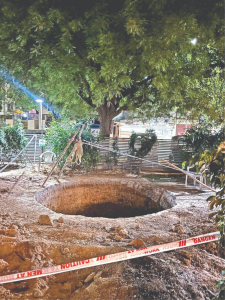Treating Rainwater As A Precious Commodity And Not Letting It Go Down The Drain Can Help Solve Several Of The City’s Problems, Including Water Shortage In Summer, High TDS In Groundwater, Flooding In Monsoon Among Others.

Photo Courtesy : Ahmedabad Mirror
High Total Dissolved Solids (TDS) in groundwater has long been a concern in Ahmedabad, with levels in many areas exceeding 2,000 ppm, far above the acceptable limit. This has led to various health complaints, from skin irritation and hair fall to gastrointestinal and kidney issues. Since most Indian cities rely heavily on groundwater, a large quantity of water is regularly pumped out of the ground, resulting in a drop in the water levels and increase in TDS and other pollutants. In cities like Ahmedabad, where the groundwater exploitation has been particularly high, almost every home is forced to filter water for drinking purposes.
The solution
The answer to the worsening water quality of the planet is quite straightforward: Rainwater harvesting. Simple techniques of percolating rainwater below ground have shown wonderful results in improving groundwater levels as well as decreasing the TDS levels in this water.
Lokendra Balasaria, founder of environment conservation group Treewalks, emphasises that rainwater harvesting is not just an environmental choice but a practical one. The simplicity of the rainwater harvesting system is its strength, he feels, stating, “Rainwater harvesting is not just about water conservation; it is about reducing pressure on civic infrastructure and improving the quality of life. The fact that it is so easy to install and maintain makes it no-brainer for most buildings.”
“Ahmedabad gets enough rainfall every monsoon. The need is to save it effectively, honestly and with transparency,” he emphasises.
“Nature based percolation solutions suggested by us have successfully decreased problems of flooding and decreased TDS of groundwater just in a couple of years showing that effective rainwater harvesting can make a huge difference to our groundwater levels and quality,” Balasaria adds.
As issues like drying borewells, flooded streets and hard water become increasingly common in Indian cities, rainwater harvesting is emerging as a smart, long-term solution. It can be done at individual level at homes and at community level in residential societies.
These systems are designed to be simple, economical and easy to maintain, capable of collecting up to 20,000 litres of water per hour of rainfall. With an estimated 100 hours of rain annually, a single building can save nearly 20 lakh litres of water each year by utilising just 30 per cent of its built-up area and a third of its rooftop.

Photo Courtesy : Ahmedabad Mirror
Save the rain
The system works by directing rainwater into borewells or purification tanks, which helps recharge groundwater levels and reduce surface runoff.
This is particularly beneficial in cities like Ahmedabad, where short bursts of intense rain often lead to waterlogging, while summers bring groundwater depletion and hard water issues.
Residents report that harvested rainwater, when blended into the water table, helps dilute these TDS levels overtime, improving water quality.
Societies that have adopted the system are already seeing significant benefits. At Maple County-2 off Sindhu Bhavan Road, the rainwater harvesting system was installed in May 2024 primarily to help refill their borewell. According to chairman Urvish Dave, the TDS levels, previously over 1100 ppm, have decreased since the installation. Twelve days of good rainfall last year allowed the society to store clean water effectively, he shares.
“That water stayed clean and useful for a long time,” he says, adding, “Initially, we faced challenges due to the vertical design of the building, but as more societies move towards high-rise formats, this system will prove to be a perfect solution. In the future, everyone might not have easy access to water, so harvesting becomes not just smart, but necessary.”
At Riviera Harmony, the story is similar. The society implemented rainwater harvesting about a year ago after struggling with water shortages and relying on pumps to raise water levels. Resident Supriya Gupta said, “It has been a great solution for us. We also have a Khambati Kuvo with a depth of about 30 feet and a diameter of around12 feet, and the system is helping recharge it. Earlier, our TDS was around 1,600 ppm. While recent checking is yet to be done, the change in water quality is noticeable as it is lighter. This is a long-term idea with sustainable results.”
Signature Apartments at Prahladnagar installed a rainwater harvesting system last year. Chairman Dr Mrugesh Shahreported a TDS drop from 1,100 to 800 ppm. “The results are already visible, and we expect even better outcomes inthe coming years. Clean water directly improves our health. This system is not just saving water but building a betterquality of life,” he said.
Harvest the rain
It is high time we acknowledged the importance of conserving rainwater. Starting today, Ahmedabad Mirror, in association with environment group Treewalks, will bring to you stories that highlight the importance of rainwater harvesting and why we as a community need to treat rain as an invaluable resource that needs to be cherished.
Join us in this endeavour to make Amdavad a city that values its water!
If you have any queries regarding rainwater harvesting or would like to know how you or your society could do it, get in touch with us. We will answer your queries and guide you.
“A’bad gets enough rainfall every monsoon. The need is to save it effectively … with transparency” –Lokendra Balasaria, Founder, Treewalks
“The results are already visible, and we expect even better outcomes in the coming years “Mrugesh Shah, Chairman, Signature Apts, Prahladnagar
NeeRain is proud to publish this blog to spread awareness about the situation of water, for our stakeholders.
This blog is published by: –
Ahmedabad Mirror
We would like to spread this for the benefit of fellow Indians.
Publish On: 26 Apr 2025
